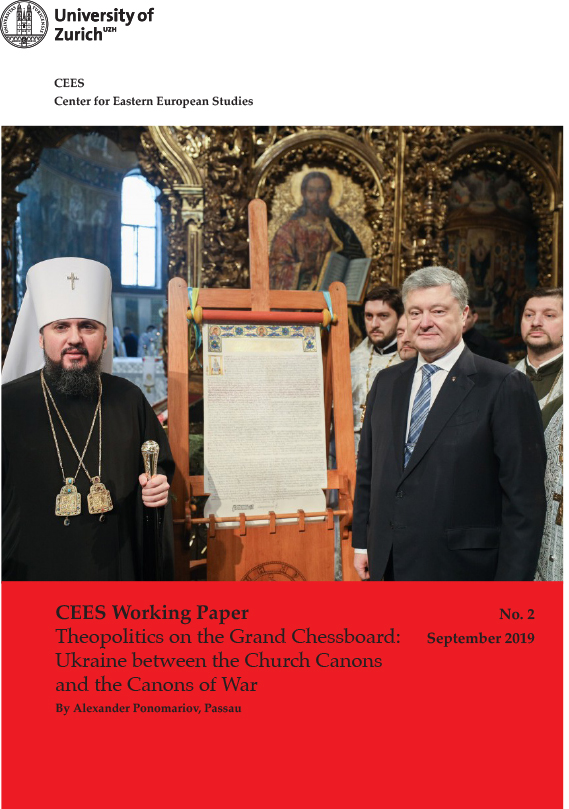CEES Working Paper No. 2: Theopolitics on the Grand Chessboard

Ukraine between the Church Canons and the Canons of War
Alexander Ponomariov
University of Zurich
September 2019
In January 2019, the Ecumenical Patriarchate in Istanbul issued a document of independence for the newly created Orthodox Church of Ukraine. Playing on an imagined Byzantine past, the document asserted the Patriarchate’s cultural leadership of the Orthodox commonwealth. This was possible because of what could be called the Constantinopolitan Consensus, according to which the Orthodox churches recognize the Patriarchate in Istanbul as primus inter pares based on interpretations of antique canon law, which remains terra incognita for researchers of international politics. Ukrainian president Poroshenko made church autocephaly one of the three pillars of his 2019 re-election campaign (“Army, Language, and Faith”). In December 2018, he even imposed martial law in the country in order to convene the required church council and amend the Ukrainian Constitution’s provisions on future NATO membership. The leaders of the Moscow Patriarchate view such events as “combat actions” (военные действия) and are ready to resist, both parties instrumentalizing the church canons as the canons of war. As such, the decision to form an independent Orthodox Church of Ukraine has resulted in new tensions, both within Ukraine and between Ukraine and Russia.
Die CEES Working Papers sind ein Online-Publikationsgefäss des Center for Eastern European Studies (CEES), die Osteuropaforschenden Gelegenheit bietet, die Resultate ihrer laufenden Forschung zu veröffentlichen.
CEES Working Paper No. 2 als PDF
Alexander Ponomariov
University of Zurich
September 2019
In January 2019, the Ecumenical Patriarchate in Istanbul issued a document of independence for the newly created Orthodox Church of Ukraine. Playing on an imagined Byzantine past, the document asserted the Patriarchate’s cultural leadership of the Orthodox commonwealth. This was possible because of what could be called the Constantinopolitan Consensus, according to which the Orthodox churches recognize the Patriarchate in Istanbul as primus inter pares based on interpretations of antique canon law, which remains terra incognita for researchers of international politics. Ukrainian president Poroshenko made church autocephaly one of the three pillars of his 2019 re-election campaign (“Army, Language, and Faith”). In December 2018, he even imposed martial law in the country in order to convene the required church council and amend the Ukrainian Constitution’s provisions on future NATO membership. The leaders of the Moscow Patriarchate view such events as “combat actions” (военные действия) and are ready to resist, both parties instrumentalizing the church canons as the canons of war. As such, the decision to form an independent Orthodox Church of Ukraine has resulted in new tensions, both within Ukraine and between Ukraine and Russia.
Die CEES Working Papers sind ein Online-Publikationsgefäss des Center for Eastern European Studies (CEES), die Osteuropaforschenden Gelegenheit bietet, die Resultate ihrer laufenden Forschung zu veröffentlichen.
CEES Working Paper No. 2 als PDF
